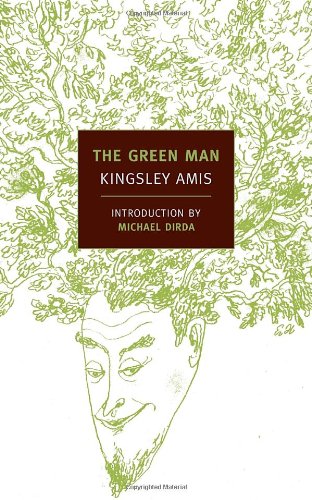
![]() The Green Man by Kingsley Amis
The Green Man by Kingsley Amis
Kingsley Amis’s sole horror novel, The Green Man, had long been on my list of “must read” books, for the simple reason that it has been highly recommended by three sources that I trust. British critic David Pringle chose it for inclusion in his overview volume Modern Fantasy: The 100 Best Novels, as did Michael Moorcock in Fantasy: The 100 Best Books AND Brian Aldiss in Horror: 100 Best Books. As it turns out, all of this praise is not misplaced, and Amis’s 1969 novel of modern-day satire and the supernatural is as entertaining as can be.
The tale concerns a middle-aged man named Maurice Allington, who owns an inn called The Green Man in rural Hertfordshire, not far from Cambridge. Allington, when we meet him, is being kept busy running his inn, struggling through a floundering second marriage, dealing with his sullen 13-year-old daughter, drinking incredible amounts of scotch every day, and attempting to talk his new mistress into a three-way with him and his wife. As if he doesn’t have enough on his plate, the ghost of diabolical necromancer Dr. Thomas Underhill — who used to live in the inn some 300 years before — has been contacting him of late, and the legendary Green Man himself (a sort of lumbering tree monster) has begun to make appearances, too. Those closest to poor Maurice suspect that his stories of ghosts and tiny birds that fly through his hand are a result of the DTs (it really is remarkable how much liquor Maurice drinks in a day), but the reader somehow never doubts that what Maurice sees is objective reality….
Mixing social satire, amusing incidents and some good eerie scenes, The Green Man keeps the reader enthralled. Amis, no stranger to the bottle himself from what I’ve read, seems to really identify with Allington, and uses him as his mouthpiece to expound eruditely on topics such as food (a hateful, bothersome nuisance), death (he wonders how one cannot be totally obsessed with the idea), sex (he thinks that women’s “emotional secretiveness” is due to the fact that they do not ejaculate) and religion (Maurice’s views of the afterlife are radically turned about by what he goes through in this tale). In one startling section of the book, Maurice meets a nice young man in a dark suit who stops Time and who, it is inferred, is none other than God himself, and another fascinating conversation ensues.
The Green Man is not an especially frightening book, although some parts (the reading of Underhill’s diary; the midnight disinterment of Underhill’s grave; Maurice’s “nighttime” vision in broad daylight) are indeed genuinely creepy. This is an extremely literate, extremely British ghost story that functions as both satire and thriller. In another section of the book, Maurice tells us that he thinks all novelists engage in a “puny and piffling art,” and that fiction is pitifully inadequate to the task it sets itself. But perhaps narrator Maurice should read back the book he has just delivered to us; it is neither puny nor piffling, and succeeds on many levels indeed.



Sandy, based on your review I just ordered this from ABE Books. This sounds like it’s right up my alley. (Women are emotionally secretive because we “don’t ejaculate” indeed!)
That sounds like a fascinating book, though Amis’s famous disdain for women seems to be very much on display. I might have to give this one a try.
Hope you guys enjoy this one as much as I did!